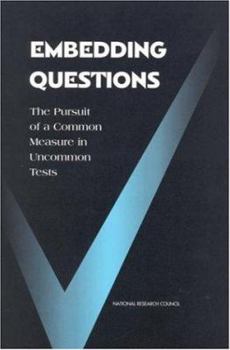Embedding Questions: The Pursuit of a Common Measure in Uncommon Tests
Policy makers are caught between two powerful forces in relation to testing in America's schools. One is increased interest on the part of educators, reinforced by federal requirements, in developing tests that accurately reflect local educational standards and goals. The other is a strong push to gather information about the performance of students and schools relative to national and international standards and norms. The difficulty of achieving these two goals simultaneously is exacerbated by both the long-standing American tradition of local control of education and the growing public sentiment that students already take enough tests. Finding a solution to this dilemma has been the focus of numerous debates surrounding the Voluntary National Tests proposed by President Clinton in his 1997 State of the Union address. It was also the topic of a congressionally mandated 1998 National Research Council report (Uncommon Measures: Equivalence and Linkage Among Educational Tests), and was touched upon in a U.S. General Accounting Office report (Student Testing: Issues Related to Voluntary National Mathematics and Reading Tests). More recently, Congress asked the National Research Council to determine the technical feasibility, validity, and reliability of embedding test items from the National Assessment of Educational Progress or other tests in state and district assessments in 4th-grade reading and 8th-grade mathematics for the purpose of developing a valid measure of student achievement within states and districts and in terms of national performance standards or scales. This report is the response to that congressional mandate.
Format:Paperback
Language:English
ISBN:0309067898
ISBN13:9780309067898
Release Date:December 1999
Publisher:National Academies Press
Length:96 Pages
Customer Reviews
0 rating





